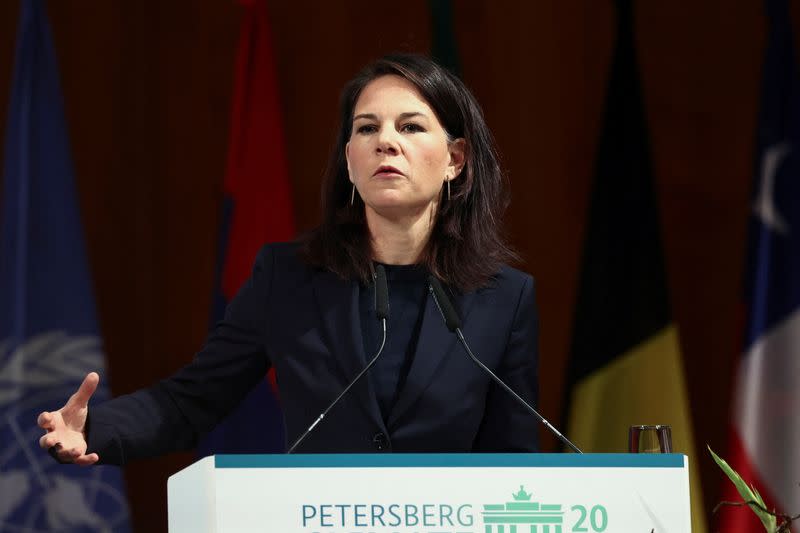German ministers call on China, Gulf states to contribute climate finance

By Riham Alkousaa and Kate Abnett
BERLIN/BRUSSELS (Reuters) -China and other big-polluting developing countries should pay more to help poor states cope with climate change, Germany's foreign and development ministers said on Thursday, as countries prepare for U.N. negotiations on a new climate finance goal.
Rich developed countries, which agreed in past U.N. talks to provide support to help poor countries cope with climate change, are hoping to persuade countries that are so far exempt, such as China and the wealthy, high-emitting Gulf states, to join them.
"I strongly urge those who can to join our effort, and particularly the strongest polluters of today, particularly looking at the G20," Annalena Baerbock said at the opening of a climate conference in Berlin, referring to the Group of 20 which includes both rich countries and big developing economies.
At a panel during the conference, Germany's Development Minister Svenja Schulze said: "Germany will contribute, we deliver our fair share, but we also ask other ones to do so."
"It's the time of taking action and we need more countries that take their fair share - all the ones who are big emitters, also the Gulf states, also China, we all need to do more."
Asked if the European Union's recent steps to limit Chinese clean technology imports could undermine cooperation, Baerbock said Germany and Europe needed to cooperate with China on climate, adding that the race between countries to produce clean tech was positive for the green transition.
"It's a positive challenge. If everybody wants to be the first to produce climate-neutral not only cars, electricity, but in the future also big industry products, then this is the best answer for the world," Baerbock said.
The European Union earlier this month said it would investigate subsidies received by Chinese suppliers of wind turbines destined for the bloc.
COP TARGET NEGOTIATIONS
Germany hosts the annual Petersberg conferences at which countries meet to discuss the agenda of the U.N. COP climate change summit held later in the year.
Climate finance needs to rise sharply to $5 trillion a year globally by 2030 to fund measures to fight climate change, according to 2021 researchers' estimates.
Countries are preparing to negotiate a new target at the COP29 climate summit in November, for how much climate finance wealthy nations will contribute to poorer countries each year.
The list of two-dozen states obliged by U.N. agreements to contribute is made up of countries that had already become industrialised decades ago. The world's top polluter China, the Gulf states, Brazil and other big developing country emitters are excluded.
The Chinese Ministry of Ecology and Environment could not be immediately reached for comment. Beijing has repeatedly said developed countries should contribute the bulk of the finance required to help poor nations decarbonise, as part of the principle of "common but differentiated responsibilities".
Azerbaijan's Ecology Minister Mukhtar Babayev, incoming President of the COP29 summit, acknowledged the divisions between countries ahead of the U.N. negotiations.
"Climate finance has been one of the most challenging topics of climate diplomacy over the years. And we know that there are strong and well-founded views on all sides," he told the conference.
Baerbock said developing countries need over $2 trillion per year for ecological transition, half of which must come from sources within developing countries and the other half from international financial flows.
Germany will keep its climate finance commitments despite budget constraints, the foreign minister said, confirming Berlin's climate finance goal of 6 billion euros per year from 2025.
(Reporting by Riham Alkousaa in Berlin, Kate Abnett in BrusselsAdditional reporting by David StanwayEditing by Peter Graff and Sharon Singleton)

 Yahoo Finance
Yahoo Finance 